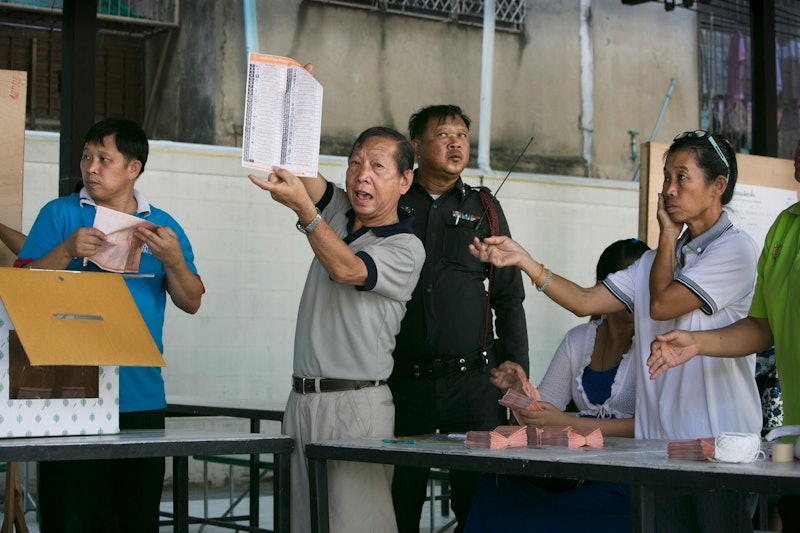News
Thai Protestors Vow to Keep Fighting, Annul Voting
In spite of Sunday's national elections in Thailand going down with very little bloodshed, Thai anti-government protestors have pledged to keep going with their campaign to oust Prime Minister Yingluck Shinawatra, promising to fight the ballots on legal grounds. Meanwhile, more demonstrations have been planned, with thousands of protestors flooding the streets of Bangkok Monday.
Demonstrators attempting to derail the ballot process managed to ultimately disrupt voting in 69 out of the country's 375 electoral districts — a small percentage, but nonetheless significant. Only 45.84 percent of voters ended up participating in the election, compared with 75 percent who voted in the 2011 election that brought Yingluck to power.
The issue is, because voting was obstructed so many districts, there likely won't be enough valid results to form a parliament. And holding by-elections in all those disrupted districts could take as long as six months, especially if the anti-government protestors continue to obstruct the process — meaning that Yingluck will probably stay as caretaker Prime Minister in the meantime. On top of all that, if by-elections are held, the protesters have said they'll oppose the legality of the elections — by law they're required to be held on one day.
The campaign to topple Yingluck's government and replace it with a non-elected "people's council" will continue on the streets as well. On Monday, Thailand's national security chief estimated that there were between 2,000 and 3,000 demonstrators flooding the streets of Bangkok. "We are not giving up the fight. We still keep fighting," said protest leader Suthep Thaugsuban . "Our mission is to keep shutting down government offices, so don't ask us to give those back."
On Sunday, though, Suthep promised to keep his demonstrations non-violent. "We need to keep our principles. We fight in peace, with no weapons and violence. We only fight with our feet and whistles," he said. "We have the right to a peaceful protest."
The possibility of bloodshed is high, as tensions continue to simmer during the coming period of political paralysis. The last few weeks have seen two grenade attacks and nine deaths, as well as the government imposing a 60-day state of emergency for the city — effectively allowing the government to censor media, place curfews, use military force to quell violence, break up gatherings, and detain suspects without charge. Over the weekend, a gunfight broke out outside a building holding ballot papers, leaving seven people injured.
Thai anti-government forces, led in large part by the People’s Democratic Reform Committee (PDRC), have been protesting for months, after a controversial amnesty bill — which would have allowed Yingluck’s brother, ousted premier Thaksin Shinawatra to come back to the country — passed the lower houses of parliament. They argue that Yingluck’s party, Pheu Thai — which is widely supported by the poorer, rural areas of Thailand — will win any electoral process and continue to be controlled from afar by Thaksin. The circumstances have left the demonstrators between a rock and a hard place, with no apparent way to democratically rectify the situation.
